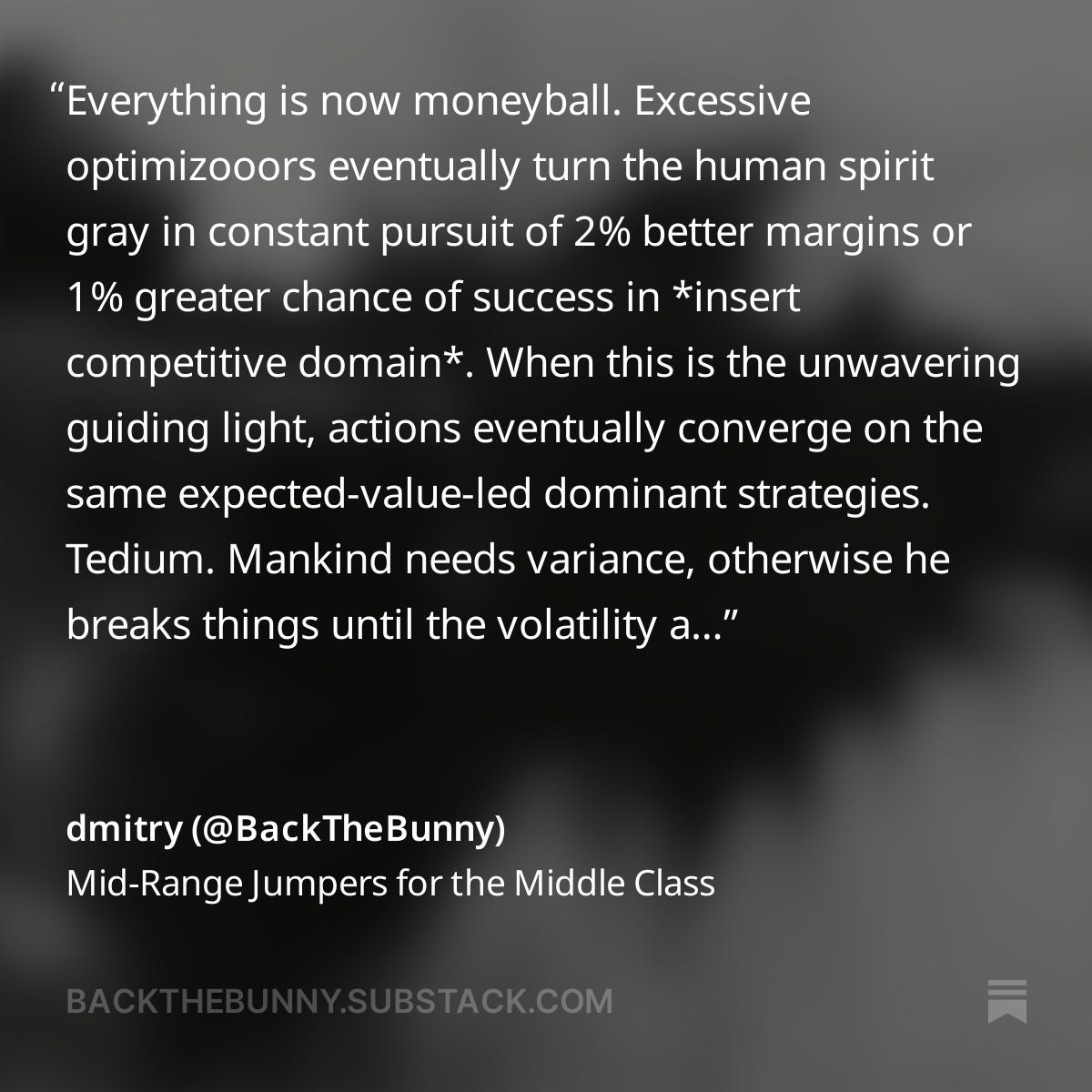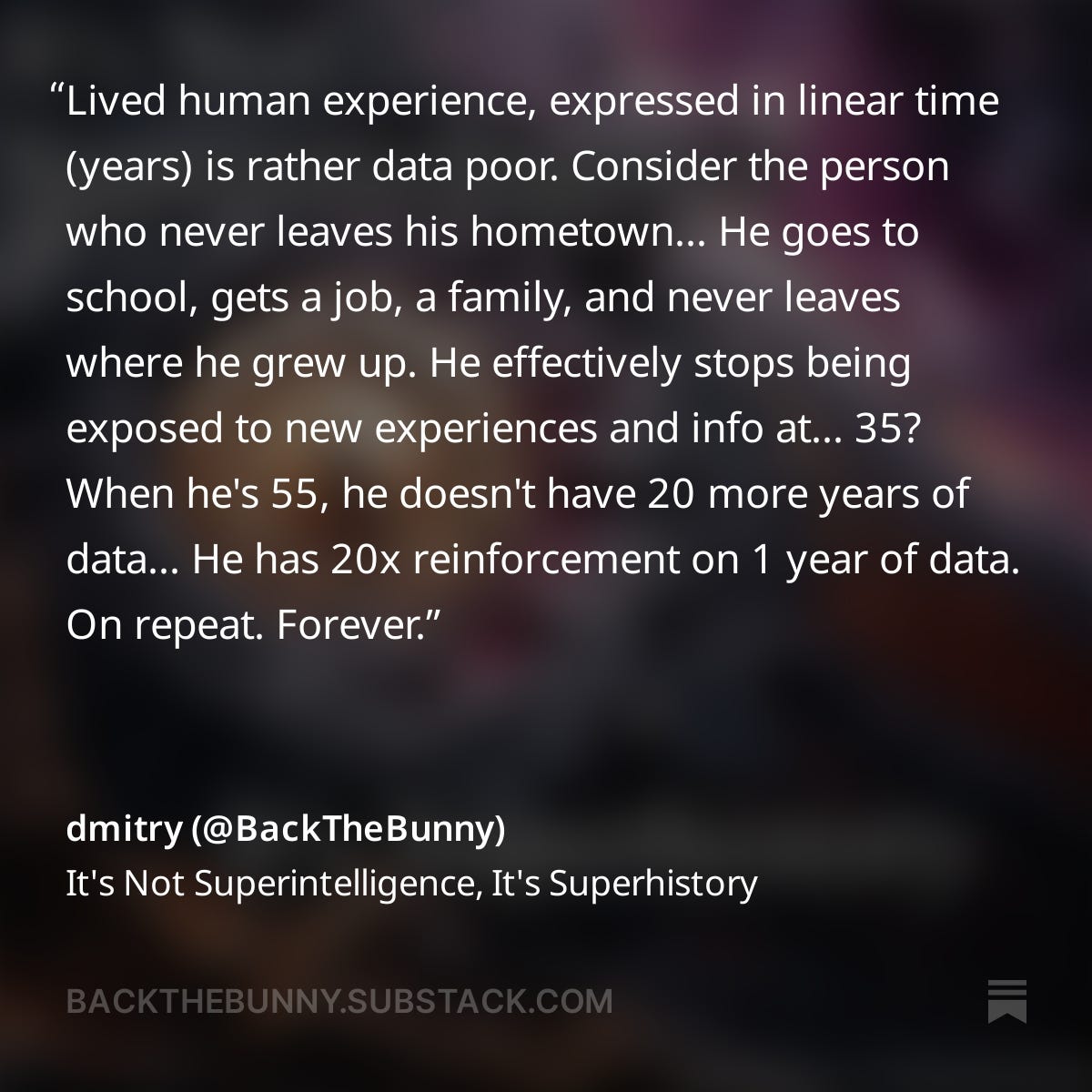The Volatility Tax Must Be Paid
Transmuting volatility into pseudo-stability produces a different cost.
I found this scrolling Twitter:
Man innately hates volatility. We're evolved to fear losing money more than making it. We dread being fired more than being stuck in an endless corporate loop of mediocrity.
We despise volatility so much, we continually try to kick the can down the road until the asphalt ends. In markets, when we transmute volatility into pseudo-stability (eg bailouts), the result is sometimes what’s known as "zombie businesses": a phenomenon where the company should have died, but was artificially kept alive via some form of government/financial intervention. It now barely makes enough to service its debt and pay operating costs, and nothing more. It’s one economic hiccup away from death. It's living and functioning similar to how Joe Biden is.
To avoid uncertainty and short-term instability, we prefer to delay the volatility tax that should have resulted in the death and rebirth of the businesses, and instead opted for a kind of Faustian bailout bargain to keep it on life support. We hate the unknown more than predictable malaise.
I think the above excerpt of the woman having a nominally ideal existence yet still feeling hollow, is a version of the human manifestation of this “zombie” existence.
When you choose only safe, conventional options that on paper should make you happy, you end up eschewing the life variance that we apparently require in some form or another… and eventually end up unsatisfied, and aren't sure what's missing. You enter a zombie loop.
Volatility is both dangerous and exciting: it’s colorful. Safety is comforting, but predictable and tedious: it’s gray. A brief, related post on the topic as it relates to sports strategy and globalism: Mid-Range Jumpers for the Middle Class
There's a quote from someone that says roughly "The utopia can never be, because man would grow so bored with it he'd destroy it immediately"; this perfectly encapsulates what this woman is experiencing in her Reddit post.
She has a utopia, and is still empty. I think this is simply part of the human condition: struggle and hardship give us a sense of purpose and meaning, and she doesn’t have any: but rather a surfeit of conventional safety and comfort. The ideal amount of trials and tribulations is not zero.
If you go too long without working towards or through something, an aspect inside you begins to chafe. Life needs color, which is to say that which you can’t always predict. Every day, week, and month cannot be the same.
The concept of data aging and life terminal loops has application to these thoughts, discussed in another post It's Not Superintelligence, It's Superhistory
A Story You Want to Read: Add an Egg
Imagine a book with no rising action, no conflict, no turmoil the protagonist must overcome. No growth. Who wants to read that story?
Well, apparently no one wants to live that story either. Hardship provides volatility and excitement requisite for growth and color. Excess comfort eventually creates a tedious existence, no danger, no uncertainty… people break things when they're bored for too long. Despite what we may say, we like having to earn it. Friction is the spice of life.
There are many psychological studies that demonstrate people value something more if they have to pay for it vs if they’re given it. You hold it in higher regard if you earned it vs it being handed to you. They like the IKEA dresser more that they had to pickup and put together themselves, rather than a pre-assembled one delivered to their door (a real phenomena).
The original Easy Bake Oven was too easy; people found it uninspiring to just stick a premade cake into an oven and turn it on. Marketers discovered when they incorporated the step of adding an egg, it imbued the process with enough work to make people feel like they were actually cooking something. Economists would say it’s optimum to remove the added friction and cost of an egg, and yet, people liked it. Revealed preference. They had no sense of accomplishment without any effort, even if it was a small one.
For whatever reason, we value what requires struggle to attain, because overcoming obstacles grants satisfaction that cannot be rationalized away. It satiates something deep inside us. I think the degree to which your life satiates you is a macro derivative of these micro, IKEA-style lessons. You have to “add an egg” from time to time.
There is no day without night, no improvement without failure, no spring without winter, and so on.
The value you find in life is related to victories you achieve, and there is no victory without challenge. Manageable-but-persistent exertion, struggle, and accomplishment bestows purpose and value. If that goes away, your life becomes a story you become less interested in reading.
Follow @BackTheBunny









Friction is the spice of life.